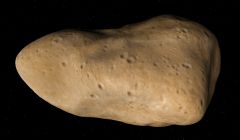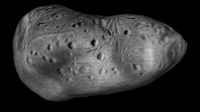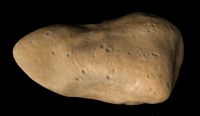951 Gaspra
| 951 Gaspra | |
|---|---|

| |
| 951 Gaspra from AsteroidPack_v1.00.zip in Orbiter 2003P2 | |
| Designation | |
| Name | 951 Gaspra |
| Reference body | Sun |
| Number of satellites | 0 |
| Planetary mean orbits | |
| Epoch | 2006 |
| Semimajor axis (a) | 330561273844.472 km (2.20966563439435 AU) |
| Eccentricity (e) | 0.174161131041245 |
| Inclination (i) | 0.0715986858283037 radian (4.10230251664494°) |
| Longitude of the ascending node (LAN, ☊) | 4.41948546253888 radian 253.2178645229° |
| Longitude of periapsis (ϖ) | 6.68046910673352 radian 382.762684983362° |
| Mean longitude (L) | 7.27107229175727 radian 416.601754852207° |
| Rotational Elements | |
| Sidereal Rotation Period | 25530 seconds (7.09 hours) |
| Sidereal Rotation Offset | 0 |
| Obliquity | 0 radians 0° |
| Selected physical parameters | |
| Mean radius | 7000 m |
| Mass | 1×10<su>16 kg |
| Equatorial gravity | 0.0136 m/s2 |
| Escape velocity | 0.0076 m/s |
| Gravity at surface | Gaspra 89% Sun 11% |
| Note | *Elements given are from 951 Gaspra.cfg file. |
951 Gaspra is an asteroid orbiting close to the inner edge of the main asteroid belt. Discovered by Grigory Neujmin on 3 January 1886, it was named after Gaspra, a retreat on Crimea. Gaspra was visited by the Gallileo spacecraft in 1991 as it was enroute to Jupiter. Gaspra is an elongated potato shaped body.
Gaspra in Orbiter
951 Gaspra was first introduced to Orbiter with the release of MainBeltAsteroids051403 in 2003.
Note that the landing surface as given in the config file is spherical, but the visual of these bodies are not, if you land, you will likely be above or below the visual surface.
| Add-on | Source | Version | Author | Type | Release Date | Compatibility | Wiki article |
|---|---|---|---|---|---|---|---|
| Asteroid Pack 1.00 | O-F Resources | 2004-11-21 | Nighthawke | Scenery | 21 November 2004 | ||
| Main Belt Asteroids v1.0 | O-F Resources | v1.0 | Unknown OHM Addon Developer | Scenery | 14 May 2003 | ||
See also
Gallery
951 Gaspra imaged by the Gallileo spacecraft during a flyby in October 1991
from Wikimedia Commons
| edit The Solar System | |
|---|---|
| Central star |
Sun (Sol) |
| Planets |
Mercury - Venus - Earth - Mars - Jupiter - Saturn - Uranus - Neptune |
| Natural satellites |
Moon - Phobos - Deimos - Io - Europa - Ganymede - Titan - more... |
| Add-ons |
Planets - Dwarf Planets - Small objects - Natural satellites - Alternative star systems |



